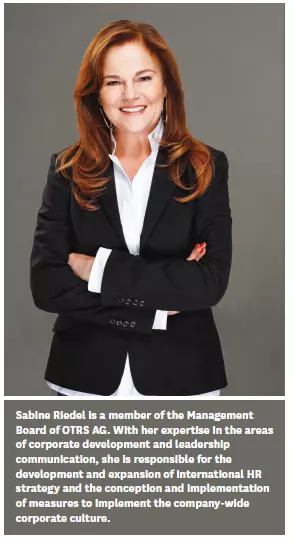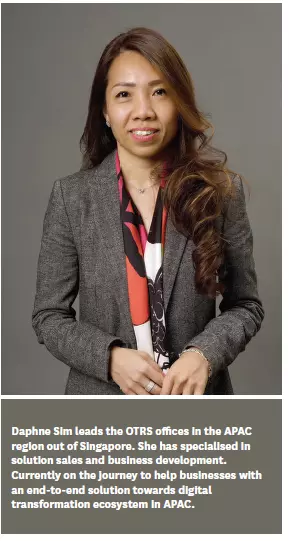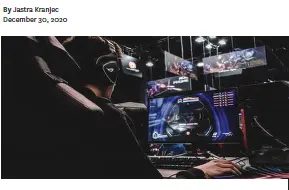OTRS Group is the manufacturer and the world’s largest provider of the service management suite OTRS. It offers flexible solutions for process and communication management to companies of all sizes, ensuring efficiency. Sabine Riedel, member of the Management Board of OTRS AG from Germany and Daphne Sim, Country Manager Asia of OTRS from Singapore discussed with Business Today, the emerging trends and lessons learnt globally and from an APAC perspective that will contribute to the year of recovery in 2021.
By Udeshi Amarasinghe
It is apparent that COVID-19 has changed the entire global landscape and the way we work. What are the trends that you see globally and in the APAC region? Sabine Riedel (SR): In Germany, we have very strict regulations in terms of labor and employment law. I think this was one of the major problems in particular for the large and global companies because they had to make great efforts to even realize remote work and home office, which was demanded in the situation. From what I can see there may be contradictory effects; some say that everyone will go back to the onsite work in offices as soon as possible and others say that the remote culture will further develop and even more companies will reduce office spaces, which by the way will also cause an effect on the whole situation of office infrastructure. I believe in general that we will have to create more flexibility and opportunities with more diverse working environments.

This will be definitely appreciated not only by the younger generations, but it also brings more advantages for younger families and especially for single parents, who have to organize kindergarten and school times. I strongly believe that the whole remote working culture is only starting to unfold and that this will also speed up the digital transformation process in companies.
Daphne Sim (DS): In Asia, we are known for face to face working situations and that is the way we prefer to work. What we see is remote work has never been thought of before. Asia is receptive to remote work considering the situation but there is technical planning to do. However, employees want to go back to work and they are waiting to see how to go back because there are many operations, manufacturing companies and resources in the APAC region. Working environments are at low cost, high resource and the work culture is different. We feel that while they are open to working remotely there is a bit of resistance. The opportunity for online channel communication has increased because of the lockdown and there is the opportunity in terms of growing that channel in Asia including small businesses and startups. They are all engaged in e-commerce. For us, we also see the trend where people are moving everything to Cloud and to ensure all information is stored and accessible. E-commerce has increased its importance significantly in Asia.
The importance of digital transformation has been clear in the current situation. In terms of preparedness what are your thoughts?
SR: In Germany, and Europe in general we are really behind when it comes to digital transformation and the current situation has shown that in a very negative way. We often underestimate that digital transformation is a very complex change process and this is one of the reasons why Germany stays behind. It is a matter of time and financial investment and in a recently concluded survey it proved that the investment German companies tend to spend is much too low.

More than this all these aspects like money, time, clear decision and a solid concept depend on each other. At any time we need to consider whether we have chosen the right approach and then the process has to be watched thoroughly and monitored in detail. Furthermore, the whole process has to be adapted where necessary. It is not only done when you say you “want to have” digital transformation. It is a long way to go, which takes time. Therefore, everyone in a company is required to have digital transformation on their agenda and, especially the management needs to consider every step to enforce the change towards a reasonable mindset to support this change.
DS: Yes, in terms of preparedness, I agree with Sabine because I see a similar situation in some of the countries in Asia. Countries such as Hong Kong, Singapore and cities such as Shanghai, the majority are fast to adapt and change quickly. Multinational corporations are prepared and it is much easier to adapt to the current situation. However, small to medium companies, with the traditional approach of businesses, they were not prepared at all. Therefore, it was a struggle since the transformation started with the pandemic. As of today they are not completely ready and are still in the process where they are trying to explore this change itself.
How do you think this affects the various sectors from business to health and education?
SR: Actually, these sectors have responded in very different ways. Business of course was never straightforward and we always had to deal with unpredictability and risk. But, with COVID-19 and the demands of digital transformation we have seen how sensitive these businesses are. But we urgently need to move forward. In Germany the only sector that was on a sufficient level of preparedness was and is the health sector. This sector is well-organized and able to take necessary next steps even in an escalating situation. The situation in education is quite the opposite. At the time when we sent students back to learn from home, it was simply not possible. The teachers, schools and the entire network were not prepared for that. Therefore, a slow digital transformation has hit us now with COVID-19. Our business is moving forward very fast, while we try to establish everything not only
for our German AG but at the same time globally. And, we have seen that various countries have responded in different ways facing difficult situations caused by the pandemic.
DS: In Asia there is a gap between different countries that we work on change and transformation itself. Singapore moved quite fast. They were able to quickly invest in health and education. In other countries in Asia, we have clients across the other region including Indonesia, Philippines, and it has been a struggle. They prefer to work on-site because of the land mass and also in terms of work culture with a preference for face to face interactions.
It is important to maintain a close relationship with customers but now it’s no longer possible in the usual sense, how do we go beyond this?
How do we keep that relationship with clients? SR: The relationship with our customers has taken place in a digitalized way for many years now. Our OTRS solution is a tool, which supports the virtual communication (with customers) in the best way and by this the digital transformation of a company in the same way. But we also can see the trend that the expectation of the customers continuously grows in terms of speed, reliability, quality and comfort with all the virtual opportunities. Therefore, it becomes more and more important to give individual, personalized support. Even if you cannot meet customers personally, you can touch them emotionally. That is the task.
DS: There is a massive change. Initially, even for us, it was essential to visit clients. However, considering the situation, video calls have made a huge difference. It improves the connection and trust because we are communicating face-to-face virtually over phone calls alone. Articulation with expressions as we speak, also with the fact that we cannot have a handshake. Fifty percent of this could be achieved from the facial expressions. Some parts of Asia are not connected cohesively on land and the only way to work for us with all borders closed, is mainly through online; and that has always been a practice for us in the company. With this current situation there are many similarities and differences between countries. But there is cross cultural learning that can be gathered through these experiences.
In terms of the similarities, how can we learn from each other?
SR: We are a global company and we have dealt with different cultures for many years. I believe we already have many lessons learned. For me personally, it is a matter of respect and open mindedness. Every culture has advantages and positive aspects and it is always about finding the commonalities and not focus on differences. This is a very important aspect when it comes to collaborations. Beyond this we have to make sure that we are aiming for the same goal. DS: We do learn from every culture because we all invest together. It has opened many doors where the community supports one another. In your opinion what does the new working environment entail? Globally as well as in Asia? SR: A stable company culture is a prerequisite; if a company does not have a good culture then it becomes very difficult to establish a new working environment. What we are aiming for and what is really necessary in general for a new working environment with the highest possible flexibility under the constraints that business goals are still achieved and the company is safe and secure for the future, is trust! Trust in the employees, their commitment and quality of work. This also means to provide employees the professional equipment to work from where ever they want and as far as that is possible and does not disturb the work flow, whenever they want. This is also the global approach and with different time zones it is essential to be flexible. This also means to encourage people to take responsibility for what they want to achieve and to let them participate in the business decision making. DS: Agreement with Sabine on all aspects because it is important to encourage high collaboration between teams. The new normal requires different leadership in business and politics.
What are your thoughts on this?
SR: The distance and not meeting your team members personally requires a lot of empathy when it comes to leadership. You either have to know your team members well to understand how they feel in this situation or you will have to learn it. This emotional connection between team members is something that is an essential part of good leadership. But it has always been the case, so I believe a good leader knows to differentiate between the needs of his team members and understands what needs to be provided to keep them successful.
What I find most important at the moment is transparency about decisions especially with something like COVID-19. It is a challenge, because being reliable and transparent in an unpredictable situation, where no one really knows where it is going needs careful consideration of proper communication. In politics I can see the same expectations, and the politicians do their very best to respond to the expectations of people. But making them understand that in an ever-changing situation with a huge lack of experience and knowledge, like we have to face it with COVID-19, decisions have to be adapted, sometimes from one day to the other, is not easy. We also can see here a lack of leadership competence in our politicians, and it is a really negative outcome if you are losing trust and are considered not reliable. Therefore, again: It is about empathy to really understand what the needs are, the transparency of what you want to achieve and how and an all-time reliability, that what you said and did is valid. DS: In Asia we require a more objective and supportive role with empathy. In terms of Singapore, the country is very clear on their objectives on what they want to reach in business and politics. It is a matter of having a work-life balance approach across Asia that can be a challenge in the future.
Going forward, what should organizations focus on?
SR: Digital transformation. There are many companies that are still behind and I think digital transformation is what we really need. When it comes to these processes, we have to focus on the employees and you have to get them on board so that they support the digital transformation and the related change process. We have learnt in the past, many times that no one really appreciates change and you have to take care that people are not afraid of digital transformation. You have to involve them and you have to focus on the company culture. Digital transformation is what organizations should focus on. DS: This year Sri Lanka had the first tea auction online and it was broadcasted. That was a real change and many of my contacts in Sri Lanka mentioned the same. As a traditional industry, the online tea auction was definitely a progressive achievement and is a positive change. Therefore, it is increasingly important for organizations to be digitally savvy. As women in IT, both of you perform leading roles.
How important is it to have women in such roles?
SR: Since I started my career I have always been in leading positions and I never had negative experiences, which is very interesting. Yet, I know that many women face problems especially in bigger companies and among them of course a lot are IT companies. It is important for women not to think like a man but stick to the individual competences women have. It is about clearly defining your own position and being your own self. Women are strong and they just have to show that. We have a brain and we have good thoughts and often I feel we are even better than men especially when it comes to empathy. We can now focus on the important aspects of the company and in business and in the economy and that really brings us forward. I would like to encourage more women to strive for leadership positions. For every company it is essential to have women in leadership roles. It brings new aspects into leadership, because women have a different way of looking at decisions, strategy, company culture and employees. The IT sector was male dominated for many years and we still have problems in hiring women in this area. Especially in Europe there are still not enough female students who decide to study software development or similar subjects. IT has to be promoted as an interesting career and that there is something to achieve. Therefore, we have some work ahead of us.
DS: In IT for Asia, for quite some time, it has been a male dominant area. But in recent years, we do see many women coming up in the leading position, including in startups and multinational corporations. We see a positive growth in Asia in terms of women in IT and leadership positions, which is encouraging for the ecosystem. What is OTRS? SR: I would say it is quite an interesting company, I have been involved in the set up of the company from the very beginning even before it was really incorporated. We tried to create with OTRS something unique and I know we were innovative. From the very beginning the OTRS Group
was organized as a decentralized organization where people would work remotely. This has not changed after 17-18 years. It had made it possible to thrive in these tough times with COVID-19. Our process of digital transformation is excellent and we know that this essentially created a very good working culture and company culture in general. We understand each other as friends, we talk about OTRS as a family. Nearly everyone can appreciate it and it is a matter of respect. We are interested in having a diverse company culture and we appreciate and respect everyone. We want to encourage people to find their individual way of work-life balance. DS: We help companies to process transformation and increase business efficiency. All this comes under the same umbrella. Many use OTRS to have transparency within the company and help with security and to secure data. Most of the private companies use our software in all their processes, communications and automation within the company itself. Airlines, banking, manufacturing and even governments are our clients for many years. They started with ground zero – from manual to using the tool itself – in the business perspective.
What’s your outlook for 2021?
SR: We have something ahead of us in 2021 because we have managed 2020 quite effectively. I am expecting a huge wave of bankruptcy, so there will be many companies who will not be able to make it through 2021. These could be some of our customers as well. Even if there’s a vaccine and we get the situation slowly under control, it will last under mid of the year until the economy is turning back to a slightly normal situation. Meanwhile China is growing and speeding up and we are staying behind. It will be a challenging year. On the other hand, we at OTRS used 2020 to implement solution management and to use the time when the economy went down to being really prepared when it’s moving forward or speeding up again. For us, 2021 will be a good year. DS: For sure in terms of business for the OTRS Group, we are in line with what Sabine mentioned. In governments in Asia, we see most are gearing towards becoming resilient and sustainable for the economy similar to Europe. Singapore for example, supported in terms of helping businesses to stay afloat. We foresee there will be more collective initiatives for businesses and the economy throughout the region.





